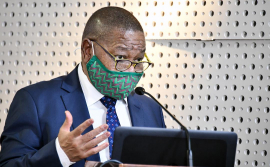
The Department of Higher Education and Training is expected to soon release the revised National Student Financial Aid Scheme (NSFAS) Funding Eligibility and Terms and Conditions for 2022.
This follows analysis performed on a group of 2021 students, where NSFAS established that 38 744 continuing students in Technical and Vocational Education and Training (TVET) colleges and universities continue to be funded, even though they have realised substantial improvement in household income over the funded period.
Briefing media on Tuesday on the state of readiness for the Post School Education and Training (PSET) sector for the 2022 academic year, Higher Education, Science and Innovation Minister, Blade Nzimande, said of this group of continuing students, 32 654 have a household income that exceeds R400 000.
“Our analysis further shows that 7 081 of these students have a household income that exceeds R1 000 000 and 632 students have a household income that exceeds R2 000 000. These students will be de-funded.
“However, NSFAS must lodge criminal charges of fraud in such instances, though the affected students may at the same time be afforded the opportunity to lodge an appeal,” Nzimande said.
He warned that NSFAS reserves the right to litigate and recover funds where instances of clear defrauding of the system have been identified.
Over 900 000 NSFAS applications received
NSFAS has received 906 429 applications during the 2022 application period. Of these students, 85% have not studied at a public university before.
Students from poor and working-class backgrounds had from 2 November 2021 to 21 January 2022 to apply for NSFAS bursaries to further their studies at public TVET colleges or universities.
This allowed applicants, who were awaiting their National Senior Certificate results, the opportunity to apply.
NSFAS initiated a system improvement process to improve the turnaround time and facilitate speedy provisional funding decisions for students using third party sources such as the Departments of Home Affairs and Basic Education, South African Social Security Agency, and South African Revenue Service data.
“With this initiative, all first-time entering students that were successfully verified as SASSA beneficiaries received immediate confirmation of funding upon submitting a complete application to NSFAS,” Nzimande said.
Nzimande said the department will be able to fund all qualifying students on the department’s bursary scheme, who have been admitted for funded programmes at public TVET colleges and universities in 2022.
New disbursement of allowances tool
NSFAS is in the last stages of implementing a new disbursement of allowances tool that will enable the organisation to accept registration data and process students’ allowances speedily and accurately.
The first payments for the 2022 academic year will be processed via the new system.
“Other initiatives that the NSFAS Board has approved include the direct distribution of allowances to students [and] a central platform for the management of student accommodation. These are envisaged to be implemented (piloted) in the first half of 2022,” the Minister said.
Dealing with historic debt
Meanwhile, NSFAS has undertaken a process called the Close Out Project to deal with historic debt, as well as the historic challenges of outstanding data reconciliation between NSFAS and institutions.
Nzimande said the Close Out Project emanated from the data challenges that were brought about by the 2017 NSFAS implementation of the student-centred model for 26 universities and 50 TVET colleges.
“This Close Out Project aims to complete all the work relating to funding of students and disbursement of allowances for the academic years 2017 to 2020,” Nzimande explained.
While there has been active participation from some universities and TVET colleges in this process, Nzimande raised concern regarding some institutions which did not provide the required feedback to NSFAS, in order to finalise the reconciliation exercise.
To date, he said, NSFAS is ready to provide Close Out and Historic Debt status reports to universities that have submitted their files for the in-scope years.
“There are 16 universities that have fully submitted their files, with 10 having one or two years outstanding; 15 TVET colleges have not submitted their files while, 11 have partially submitted and 19 have fully submitted.
“We once again urge all outstanding institutions to submit their full reconciliation files to NSFAS by no later than end of February 2021. Institutions that are not honouring this process will continue to prejudice students that can be resolved to resume their studies,” Nzimande said. – SAnews.gov.za


